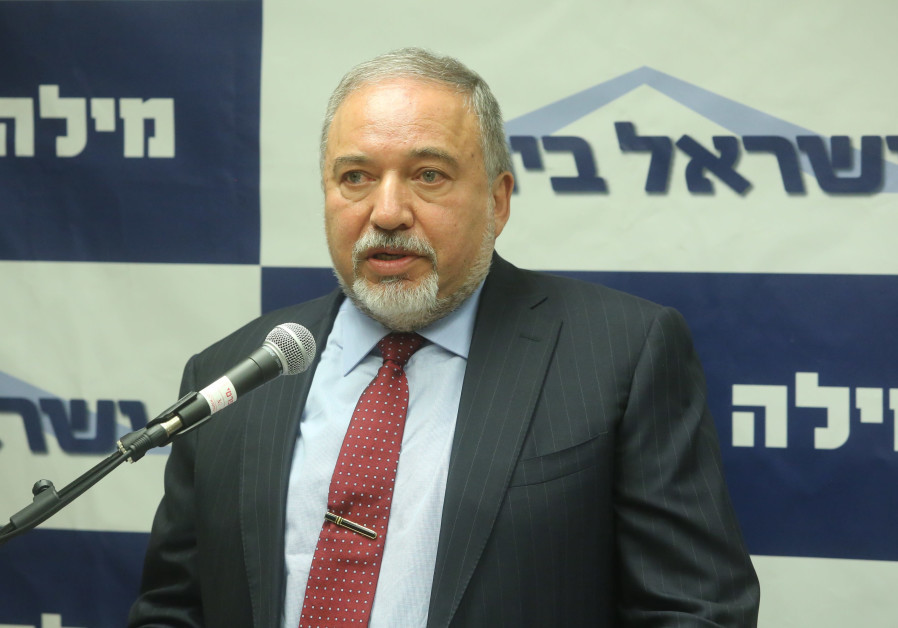Erez Crossing closed to create link between security and economic benefit

Defense Minister Avigdor Liberman speaks at a faction meeting on June 18th, 2018. (photo credit: MARC ISRAEL SELLEM/THE JERUSALEM POST)
Israel on Sunday morning closed the pedestrian crossing into Gaza in response to Friday’s violent border riots, in what Defense Minister Avigdor Liberman said was an attempt to create a direct link between economic benefits for Gaza and security in Israel.
Liberman, in an interview with KAN Bet radio, said he is trying to have a dialogue with the Palestinian public “above the heads of the rulers – above the heads of Hamas leadership,” and to get the public to understand that there is a direct link between economic benefits for Gaza and security quiet in Israel.
“It cannot be that someone will get economic benefits and not worry about the security quiet,” he said. “So the moment there was violence on Friday, immediately afterward we respond. If the violence continues, we will respond even more harshly.”
Since July, Israel has linked the routine operation of its two crossings into Gaza with the cessation of Palestinian violence in the Strip.
Israel maintains a military blockade on Gaza that prevents air or sea traffic, so that the only access to the coastal enclave is by land through three crossings, two of which are under Israeli control. There is a commercial crossing at Kerem Shalom and a pedestrian one at Erez. There is also a pedestrian crossing between Egypt and Gaza at Rafah, which is also used for limited commercial traffic.
From July 10 to August 15, Israel banned the entry of commercial goods into Gaza at the Kerem Shalom crossing. The re-opening of Erez was conditional on the understanding that Hamas would halt its firing of rockets and incendiary devices against Israel.
While it has largely held to that understanding – though some inflammable kites and balloons did continue to fall in the region around Gaza and set fires – Hamas did allow for Friday’s violent riots. As a result, Israel closed the Erez crossing to all but humanitarian cases, such as trips for medical treatment in Israel.
(function(w,d,s,i){w.ldAdInit=w.ldAdInit||[];w.ldAdInit.push({slot:10834723912266086,size:[0, 0],id:”ld-9628-9059″});if(!d.getElementById(i)){var j=d.createElement(s),p=d.getElementsByTagName(s)[0];j.async=true;j.src=”//cdn2.lockerdomecdn.com/_js/ajs.js”;j.id=i;p.parentNode.insertBefore(j,p);}})(window,document,”script”,”ld-ajs”);
The closing of Erez comes amid intensive efforts by a number of players, including Egypt, the UN, the US and the EU, to broker a long-term truce.
One of the reasons this is proving so difficult, Liberman said, is because of the intra-Palestinian fighting between Hamas and the Fatah-controlled Palestinian Authority.
“We need to understand that what is happening now is an internal Palestinian conflict that they are trying to drag us into,” Liberman said. The Defense Ministry noted the tension in Gaza began in late March after the PA stopped paying salaries there and making electricity payments for the coastal strip.
Liberman said PA President Mahmoud Abbas understands he is unable to end Hamas’s control of Gaza, and as a result is trying to bring about a deterioration of the situation between Gaza and Israel, while at the same time try to torpedo any efforts at reaching a long-term truce between Israel and Hamas.
“Our interest is quiet,” he said. Liberman said that although Israel is not speaking with Hamas, it is speaking to the Egyptians and the UN, who are speaking to the terrorist organization.
“This is not something new,” he noted.
In the interview, Liberman took aim at Education Minister Naftali Bennett, who has been sharply critical of his handling of the Gaza crisis, saying over the weekend that Liberman’s Gaza policies were tantamount to “surrender” to terrorism that is dangerous for Israel.
“It is clear that he is not speaking about security issues, but about elections and party politics of the lowest kind,” Liberman said of Bennett in response. “My position is that before we send soldiers to the battlefield, we must try all other options, and that is what we are doing.”






Comments are closed.